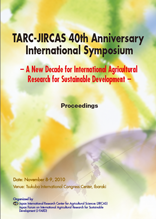Japan Intellectual Support Network in Agricultural Sciences ? its objectives and function

Background
In Japan, it is pointed out, on the one hand, that universities and research organizations should
form a network to circulate information, exchange faculty, and promote collaborative research. At the
same time, however, due to the transformation of national universities into independent administrative
agencies, competition within and among academic fields is intensifying. Under such circumstances,
although both individual researchers and universities must demonstrate successful results, the status
quo is that it is getting harder to cooperate and collaborate among universities. However, with such a
competitive world in mind, it is necessary and becoming more important to accomplish these
achievements through collaboration, not as individual efforts.
Especially in the area of international cooperation, individual cooperative projects by Japanese
researchers are usually carried out independently. However, from the point of view of foreign partners,
we are all considered as official visitors or delegations from Japan. While it is important to
demonstrate that individual cooperation projects are being implemented, the current challenge is to
show a more integrated approach to this international agricultural cooperation.
As above, it is necessary for us to share information domestically and in more effective ways.
And at the same time, it is also necessary to form various types of cooperative mechanisms.
Objectives and function
Japan Intellectual Support Network in Agricultural Sciences (JISNAS) was founded on
November 30, 2009, as a cooperation network among Japan-based universities, international
agricultural research institutions and international cooperation agencies, whose focuses are agricultural
sciences and international agricultural cooperation. Members are presently 29 organizations and 5
persons. Its objectives are to promote international research collaboration and higher education for
human development, not by a single university but a team of universities of common interest in
cooperation with counterpart organizations of developing countries under funding support by MEXT,
JICA and so on.
To achieve its objectives, JISNAS acts following activities in cooperation with
Japanese/foreign universities, related Ministries/government agencies, and international cooperation
organizations: (1) to support for enabling the operation of international cooperation, (2) to integrate
and network dispersed knowledge, technologies and human resources, (3) to maintain and promote
motivation of researchers/faculty, (4) to promote project entrustments through the network operation,(5) to promote understandings of international cooperation activities by university faculty/staffs and
the general public and (6) any other activities to achieve the objectives of JISNAS.
IReNe-AFF
A prominent activity to support the development of collaborative research project is the
regular survey of intellectual resources of members and non-members of Japan and international
cooperation needs of developing countries by using interactive web system
(http://www.inicaf.org/irene/index.php) and store the results as a database, IReNe-AFF (Database of
Intellectual Resources and Needs in areas of Agriculture, Forestry and Fisheries). By analyzing
matching between resources and needs, JISNAS intends to suggest or propose the development of
international collaborative research projects by members and, in addition, make a suggestion to
MEXT, JICA and others for their policy development of international cooperation. It is true that we
need to conduct field surveys on the ground and discuss face to face among foreign and Japanese
partners the subjects of common interest for making collaborative research proposals and/or human
resources development through the collaboration, but the IReNe-AFF will be useful as well to
overview Japan’s resources and foreign needs and to find the subjects for possible future collaboration
and partners as well.
In the database collected so far in Japan and in 19 developing countries (10 in Asia/Oceania, 8
in Africa and 1 in Europe), biodiversity, poverty reduction, agricultural extension/education, rural
livelihood, genetic resources, conservation agriculture (sustainable agriculture), agricultural policy,
farmers’ organization, crop protection (diseases & insect pests management, IPM, etc.) and soil
conservation are the keywords which show high matching between resources and needs. On the
contrary, resources seems to be lack in climate change/global warming, post-harvest, agricultural
information, agroforestry and gender although needs for these keywords are high in the developing
countries. So it would be recommended to strengthen the research fields of these keywords so as to
tackle these needs of developing countries.
Research/training proposals
Examples of collaborative research proposals made through JISNAS activity are a) Project for
the promotion of improved crop production in the mountainous areas of North Vietnam (adopted), b)
Identification and monitoring of new viral strains from potential disease carrier, the fruit bat (Pteropus
sp.), c) Improvement of rapid diagnostic kit and production of therapeutic human monoclonal
antibody for malaria, and d) JICA Group Training on development of core agricultural researchers for
rice promotion in Sub-Saharan Africa. As such, we are trying or challenging to develop research or
training proposals as many as possible.
With foundation of JISNAS, we have high expectations that cooperation in agricultural
research and education among universities and research organizations in Japan will become more
substantial, concrete and visible. Furthermore, we understand that setting up an effective and efficient
operational mechanism through which all group members will feel the benefits of membership in
JISNAS is a key to make it function and sustainable. Therefore, we expect you active support,
understanding, and participation in JISNAS to contribute to the sustainable development of the world.
| Date of issued | |
|---|---|
| Creator | Shuichi Asanuma |
| Subject |
University network agricultural cooperation research collaboration intellectual resource/needs international cooperation |
| Publisher | Japan International Research Center for Agricultural Sciences |
| Available Online | |
| Issue | 2010 |
| spage | 88 |
| epage | 96 |
| Rights | Japan International Research Center for Agricultural Sciences |
| Language | eng |
